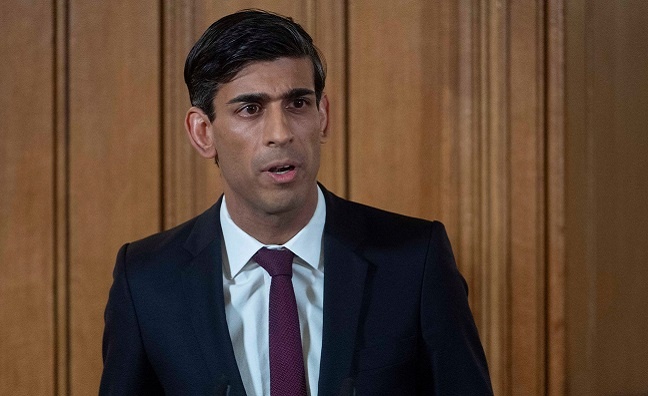The music industry was hoping the government’s latest support package would provide a lifeline to thousands of self-employed workers, as Music Week went to press.
After weeks of lobbying, UK Music, AIM, the Musicians’ Union and others welcomed Chancellor Rishi Sunak’s belated programme of financial aid for self-employed workers, having previously offered help to employees affected by the coronavirus crisis. The government will pay 80% of self-employed workers’ average profits over the past three years, for those with average profits of less than £50,000. But help will not be available until June.
The measures were welcomed by trade bodies, although whether they went far enough was still being debated as Music Week was printed. But what was clear was how desperately support is needed by the music industry’s army of freelancers. Many saw their livelihoods disappear overnight as tours were cancelled and releases shelved. Music Week spoke to a number of self-employed workers, all of whom were already feeling the effects of the outbreak.
“It’s been saddening to see the business I’ve built up over 20 years falling to pieces before my very eyes,” said Andy Saunders, founder of music industry PR firm Velocity Communications. “If you’re a consultant, it’s difficult sometimes to justify your role to a company whose main concern is to stay afloat as a business and do the right thing by full-time staff. I totally understand that, but I’m reliant on retainer income and it impacts me massively.”
Nadia Khan, owner of management firm Ctrl Music, whose clients include Lethal Bizzle, said all areas of her business had been impacted by the outbreak.
“It’s changed everything,” she told Music Week. “I work on a purely commission basis so I only earn based on whatever income comes in. Two weeks ago, our shows started getting cancelled. Our regular club bookings have all been postponed indefinitely, our summer residencies have been put on hold.
“Even a really big sync deal that we’d actually signed the contract for, contacted me wanting to pull out,” she added. “Freelancers are screwed, basically, because they rely month-by-month on that income.”
The shutdown of months of live dates and festivals, in particular, is having a huge knock-on effect. Michael Brennan works front of house sound for artists and has had three tours from March to May postponed, including a world tour with a rock band. His recording studio and rehearsal rooms have also had to close, bar a few remote sessions.
“Everything has been cancelled until the end of May – and it just keeps coming,” said Brennan, who does not anticipate a full return to normal until early 2021. “Lots of negatives keep popping up.”
Anna Neale earns a living across a portfolio career that includes lecturing in music production and music business, plus work as a songwriter, producer and composer of music for adverts. Although there has been an increase in demand for remote education work, she estimates the shutdown could ultimately cost her 60% of her income.
“When you think about how much money music pays in tax and National Insurance, the self-employed have been hung out to dry,” said MU member Neale. “I already know people who have had to stop doing music or are shutting their business because they can’t see a way forward.”
While all the self-employed workers spoken to for this report welcomed government support, many also called for the wider music industry to do more. The MU, Spotify and PRS For Music have launched hardship funds, but some want larger music industry companies to also get involved.
“There is surely scope for labels to help out,” said Neale. “They’re doing quite well at the moment, perhaps they could put support artists and have schemes to help new talent.”
While many spoke of support and unity across the industry, others reported freelance workers being unceremoniously dropped from ongoing projects.
“Within 24 business hours [of the shutdown], I’d received emails from labels asking my company to step down from projects and cutting off our fees with, at most, two weeks’ notice,” said one independent PR company director, who asked to remain anonymous. “The result was a practically overnight 50% loss of income. Income tied not to tours, but to record releases. Speaking with others in the independent music PR sector, sadly, my company was not alone.”
While Andy Saunders had not been on the end of similar incidents, and expects his company to ride out the storm, he warned “people won’t forget” such behaviour.
“It’s imperative that, if you’re in a position to help third parties that are important to what you do, you absolutely should,” said Saunders. “When this is over, we will move forward together – but we won’t be able to if we have destroyed a whole strata of our industry by not supporting them through this very difficult period.”










